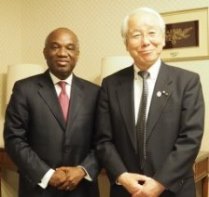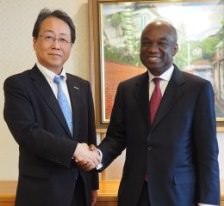WHO Deputy Director General Visits Kobe, the WHO Kobe Centre, and Japan

On 6 April 2017, WHO Deputy Director General, Dr Asamoa-Baah, conducted his first official visit to Kobe, including to Governor Toshizo Ido, Hyogo Prefecture, to Vice Mayor Toshiro Tamada, Kobe City, and to the WHO Kobe Centre (WKC).
In all of his visits, Dr Asamaoa-Baah noted the unique contributions of the Centre within WHO and to the local and global community. Borrowing from the term "glocal," WKC has effectively translated research and practice lessons to and from Hyogo/Kobe to the rest of the world. WKC is a testbed for innovations, which are led by its multi-disciplinary and multi-national staff. WKC’s past and present work, particularly universal health coverage, innovation, ageing, and health emergencies, were recognized.
He recognized the excellent work of the WKC staff and their multi-disciplinary approaches to galvanize the contributions of many Japanese and international researchers. In this way, WKC is unique in WHO, along with its ability to collaborate with many parts of the Organization globally.
In his visits to Governor Ido and Vice-Mayor Tamada, Dr Asamoa-Baah thanked them, the citizens of Kobe, and the Kobe Group’s generous support to WKC since 1996.
During his meeting with Governor Ido, both he and Dr Asamoa-Baah recalled Governor Ido’s visit to WHO Headquarters in Geneva in 2007. Dr Asamoa-Baah noted his satisfaction that WKC has grown so much thanks to the support and cooperation of Hyogo Prefecture. He also praised Governor Ido for his leadership over the past 16 years and his many accomplishments ensuring the health and safety of Hyogo’s citizens.
In visits to both Vice-Mayor Tamada and Governor Ido, everyone agreed that WKC had significantly contributed to the G7 Health Ministers meeting last year by sharing common challenges we all face, such as rapidly ageing populations, dementia, and the need for measures against infectious diseases. Dr Asamoa-Baah noted that WKC represented "a success that we have seen rarely in recent years" and he was confident WKC would contribute in the future. Dr Asamoa-Baah further congratulated the Vice-Mayor and Governor on the world class biomedical research occurring at the Kobe Biomedical Innovation Cluster and the fact that Kobe has become a symbol of successful reconstruction after the Great Hanshin Earthquake.

Dr Asamoa-Baah’s visit in Tokyo
On 31 March, Dr Asamoa-Baah delivered the closing remarks to the first WKC flagship UHC Leadership Development Capacity programme held in Yokohama City and Kanagawa Prefecture. The programme focused on health systems strengthening for ageing populations. Teams from Cambodia, Malaysia, Viet Nam, as well as Japan and Singapore participated.
On 3-4 April, the WHO Deputy Director General had the opportunity to visit the Healthcare New Frontier Initiative in Kanagawa Prefecture and to meet with Governor Kuroiwa and senior officials of the Prefecture.
Finally, on 7 April 2017, Dr Asamoa-Baah met with Minister of Health Yasuhisa Shiozaki, along with Dr Douglas Bettcher, Director, WHO Department for Prevention of Noncommunicable Diseases, where they discussed the need for a ban on smoking in all public places, including all indoor spaces, in Tokyo. They handed a letter from Dr Margaret Chan, WHO Director General, to Minister Shiozaki expressing the hope that Japan would implement the policy before the Tokyo 2020 Olympic and Paralympic Games.

